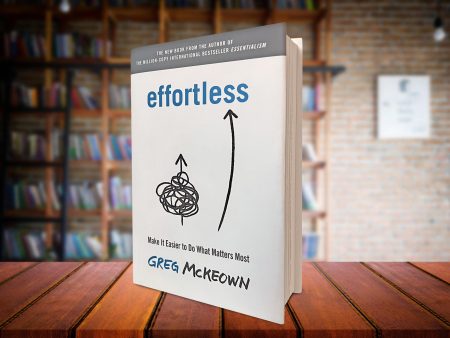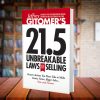The discussion of time management is repeated everywhere today. Everywhere you look, you will find a book or an article or a video about it. Under the pressures of society, many people obsessively focus on time management to keep up with the hectic pace of modern life.
This way of thinking that you can do more things in 24 hours a day usually does not lead to satisfactory results and causes excessive stress. Instead of multi-tasking, sometimes it is wise to limit yourself and focus only on the important things.
Join us to talk more about priorities in life and business during the review of Babauta’s book.
Book Review – “The Power of Less” by Leo Babauta
You probably have had the experience of having to do several things at the same time. Like when you are eating breakfast and also sending an email and also coordinating your daily schedule with your partner, maybe you are even reserving a parking space online too!
This type of behavior, which becomes a daily routine for some people in their whole life, is probably due to this root belief that “time should be used in the best possible way”.
According to Leo Babauta, with the help of changing attitudes and general strategies, you can achieve a more comfortable and efficient life.

Leo Babauta
Leo Babauta is a reporter, editor, speechwriter, and freelance writer. He founded ZenHabits.net with no funding in January 2007, and one year later it is a top 50 blog with about a million unique visitors per month. Using the methods he shares in THE POWER OF LESS, he’s trained and successfully completed a marathon. he’s doubled his income, he’s eliminated his debt, he’s quit smoking, and he’s written a novel.
Babauta has a large family. Despite the many daily worries, he refused to choose a busy and crazy lifestyle. Babauta believes that if you examine your core beliefs, values, and goals, you can sort out the things that complicate life and focus on the things that really matter. Although the author does not want to enter a new field and raise new issues, we find his suggestions and views useful.
Naturally, it is impossible to do all the favorite things, so rules and restrictions are needed in life. In this book, Babuta provides six instructions, which we rapidly review.
1. Set limits
Setting limits heals feeling trapped and broken. You need to determine which goals, tasks, or responsibilities have the most impact on your life and which ones are not so necessary. Then you should focus on the essentials.
Living without limits may sound appealing, but it actually creates chaos. You would probably agree that choosing between 5 different flavors of ice cream is easier than choosing between fifty.

Limits allow you to narrow down your options and focus your energy. Creating boundaries can be effective in any aspect of your life, but it is most effective in the workplace. Many people are overwhelmed with emails, mobile phones, projects, meetings and responsibilities. Setting a limit, like checking email twice a day instead of forty, may seem awkward at first, but once it becomes a habit, you’ll find that one aspect of your life becomes easier to manage.
2. Choose what’s important
Determining the main issues in life requires a careful self-examination regarding the following:
Principles: Consider your values, standards, and ethics. After all, every human being lives based on a series of basic and special beliefs.
Goals: When your short-term and long-term goals are clear, it allows you to find out what works in line with those goals and what works against them.
Priorities: Ask yourself what are your main personal and professional concerns? What is really important?
Results: Investigate the effects of your behaviors and decisions at home and at work. Remember that the seemingly small and insignificant tasks are actually the big and important tasks in your life.
Wants vs. Needs: Do You Really Need Those Expensive Shoes? Most of the things you are looking for right now are probably unnecessary. You should take time to think and choose the important things.
3. Make things simple and understandable
Many people can probably name more than 10 goals they want to achieve in the next few years, but they usually guarantee their failure by tackling them all at once.
Achieving valuable goals requires commitment, focus and effort. So pick a dream that you can achieve in 6-12 months and break it down into smaller goals. It is even better to design something like a flowchart that describes exactly the steps to reach that goal.
Now it’s time to design a step-by-step plan to control the process of achieving the goal. Use the Simple Projects List to manage daily or short-term tasks. Make a list of all the projects you want to pursue in life. Choose three important ones. Put the rest on the waiting list. Focus on completing these three items. So instead of being overwhelmed by too many tasks, you’ll get them all done.

Do not tolerate distractions or waste of time. Work productively. If your coworkers are getting in the way of a project, or you’re waiting for something your manager needs to give you, move on to another project on the list. Break projects down into smaller activities. By doing these activities daily, you will finish your work faster. It’s best to control the projects yourself, but often your manager is the decision maker. Share your strategy with him and explain its benefits. In many cases, the boss will let you run your own schedule. Otherwise, ask him to choose a project that you should focus on, since you also have a time limit. If your boss won’t accept reality, it’s time to look for another job.
4. Be focused
To be successful at work and have a meaningful life, you need to develop the ability to focus. Willpower is important, but if you can’t focus on an activity, it’s not enough. Regrets about the past and worrying about the future destroy your ability to focus on the present—the only thing you can control.
Keep your positive outlook; Don’t let negative thoughts overwhelm you and stop you from continuing.
The uncontrollable pace of today’s modern society has made multitasking a way of life. People talk on cell phones while driving. Your boss assigns you two new projects while you are working on another project.
Juggling with three or four balls at a time may be common nowadays, but it is not healthy and useful. Focus on only one thing at a time. Every morning, identify your most important task at work and make sure to complete it. If possible, do not answer the phone, do not search the Internet and do not read your emails. Learn to be organized. Be aware of your mental patterns. If you know you’re losing focus and feeling sluggish, get up, take a walk, and eat a small, healthy snack. Then return to work with renewed focus and energy. At the end of the day, celebrate your successes.
5. Build useful habits
John Maxwell says that your life will not change unless you change the things you do every day. This means that you have to replace the good habit with the useless ones. By following the steps below, you can create good habits within 30 days:
Choose a habit: Choose a good habit every month. Choose a habit that has visible and specific effects. Start with a simple habit, like cleaning your desk. Do 10 minutes of daily exercise. Make sure progress is measurable.

Put your schedule on paper: write down the necessary daily steps and the timing of their completion. Compulsion to do things motivates you to do them.
Tell others about your decision: Tell people about your new venture. Email your friends and colleagues, or create a blog to share this information with others.
Report your progress: Let everyone know how far you’ve reached your daily goals. If you succeed, you will enjoy their congratulatory messages. Their encouragement and valuable feedback will help you as you struggle. Rejoice in your successes.
6. Minimize tasks as much as possible
Although many tasks are complex, many tasks can also be very simple, provided that nothing interferes with doing them. Why should you visit friends’ Instagram while doing something? You can speed things up with the help of these commands:
Less is better: If you don’t need to check emails every hour—for example, to receive orders from customers—check your emails only twice a day, at 10 a.m. and 4 p.m.
Prioritize: Millions of people turn on their computers every morning and quickly check their emails. This allows email to dictate their daily schedule. Paying attention to projects, goals and tasks is much more important.
Shut down and focus: Turn off the alerts that tell you when you’ve got new email, they’re all distractions.
Fight the urge: Breaking the habit of checking email requires devoting most of your effort to the task for a week or two. Leave a sign for yourself to remind you of this. Resist the urge to check email out of habit.
Filter, filter, filter: Find a reliable program to remove junk emails from your inbox. Tell friends and family members that you are not interested in receiving prank and other junk emails.
Reply, send to specific folder or delete: decide what you want to do with each message. Reply to it now, move it to a specific folder, or delete it. Do not let these emails remain in your inbox.
Answer short: Try to keep your answer to emails less than 5 sentences. You can also quit surfing the internet. This may seem scary at first, but try disconnecting from the internet for an hour. Give your full attention to your work. Do your online research before you start. Disconnecting from the internet may make you feel insecure and vulnerable, but as you continue this practice, you will become more comfortable and creative.







